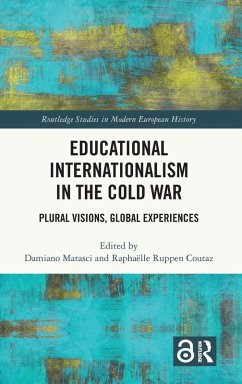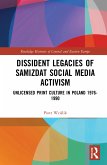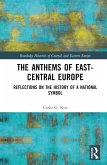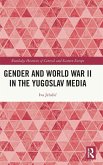Educational Internationalism in the Cold War
Plural Visions, Global Experiences
Herausgeber: Matasci, Damiano; Ruppen Coutaz, Raphaëlle
Educational Internationalism in the Cold War
Plural Visions, Global Experiences
Herausgeber: Matasci, Damiano; Ruppen Coutaz, Raphaëlle
- Gebundenes Buch
- Merkliste
- Auf die Merkliste
- Bewerten Bewerten
- Teilen
- Produkt teilen
- Produkterinnerung
- Produkterinnerung
This edited volume delves into the intricate landscape of educational internationalism during the Cold War, providing an in-depth examination of its diverse forms, impulses, and global impacts.
Andere Kunden interessierten sich auch für
![East Central Europe and Communism East Central Europe and Communism]() Sabrina P RametEast Central Europe and Communism153,99 €
Sabrina P RametEast Central Europe and Communism153,99 €![East Central Europe Since 1989 East Central Europe Since 1989]() Sabrina P RametEast Central Europe Since 1989172,99 €
Sabrina P RametEast Central Europe Since 1989172,99 €![Dissident Legacies of Samizdat Social Media Activism Dissident Legacies of Samizdat Social Media Activism]() Wci &Dissident Legacies of Samizdat Social Media Activism172,99 €
Wci &Dissident Legacies of Samizdat Social Media Activism172,99 €![The Anthems of East-Central Europe The Anthems of East-Central Europe]() Csaba G KissThe Anthems of East-Central Europe157,99 €
Csaba G KissThe Anthems of East-Central Europe157,99 €![Gender and World War II in the Yugoslav Media Gender and World War II in the Yugoslav Media]() Iva JelusicGender and World War II in the Yugoslav Media172,99 €
Iva JelusicGender and World War II in the Yugoslav Media172,99 €![The Partisans and Politics The Partisans and Politics]() Joze PirjevecThe Partisans and Politics187,99 €
Joze PirjevecThe Partisans and Politics187,99 €![The Post Cold War World The Post Cold War World]() Michael CoxThe Post Cold War World187,99 €
Michael CoxThe Post Cold War World187,99 €-
-
-
This edited volume delves into the intricate landscape of educational internationalism during the Cold War, providing an in-depth examination of its diverse forms, impulses, and global impacts.
Produktdetails
- Produktdetails
- Verlag: Taylor & Francis
- Seitenzahl: 292
- Erscheinungstermin: 27. November 2024
- Englisch
- Abmessung: 234mm x 156mm x 19mm
- Gewicht: 612g
- ISBN-13: 9781032162690
- ISBN-10: 1032162694
- Artikelnr.: 71263741
- Herstellerkennzeichnung
- Libri GmbH
- Europaallee 1
- 36244 Bad Hersfeld
- gpsr@libri.de
- Verlag: Taylor & Francis
- Seitenzahl: 292
- Erscheinungstermin: 27. November 2024
- Englisch
- Abmessung: 234mm x 156mm x 19mm
- Gewicht: 612g
- ISBN-13: 9781032162690
- ISBN-10: 1032162694
- Artikelnr.: 71263741
- Herstellerkennzeichnung
- Libri GmbH
- Europaallee 1
- 36244 Bad Hersfeld
- gpsr@libri.de
Damiano Matasci is a senior research associate at the University of Geneva. His research explores the history of Europe and colonial Africa in a transnational and transimperial perspective, with a focus on education, childhood, and science. He is the author of Internationaliser l'éducation. La France, l'UNESCO et la fin des empires coloniaux en Afrique, 1945-1961 (2023) and L'école républicaine et l'étranger. Une histoire internationale des réformes scolaires en France, 1870-1914 (2015). Raphaëlle Ruppen Coutaz is a senior lecturer at the History Department of the University of Lausanne. Her research focuses on the history of international cultural relations and draws on a variety of fields and approaches: history of the media, history of European integration, and digital history. She is the author of La voix de la Suisse à l'étranger. Radio et relations culturelles internationales (1932-1949). She is currently conducting research on the pro-European educational networks during the Cold War. She was a visiting fellow at the Department of History and Civilization of the European University Institute in Florence and a visiting professor at the Research Center of Excellence "Écrire une histoire nouvelle de l'Europe" (LabEx EHNE) in Paris.
Foreword Introduction: Internationalism, Education, and the Global Cold War
Part 1: Rethinking Educational Exchanges and Encounters 1. British European
University Interchange Policy (1945-1956): Constructing a European
Identity? 2. North Korean Orphans in Poland: Experiences and Legacies of
Education in Socialist Internationalism, 1953-1962 4. Building the Bridge:
Chinese Immigrant Scholars in American Universities, 1950s-1970s Part 2:
Shaping Minds and Societies 5. Knowledge for Free? Why Two US American
"Mobile Radioisotope Training Laboratories" Embarked on a World Tour in
1958 6. Assessing the Role of Subnational Actors in Educational Cooperation
and Development Aid: The Case of Bavaria 7. Fighting Communism with
Political Education: the Schweizerische Aufklärungsdienst and the
Anti-Communist Network People and Defence, 1965-1985 Part 3: Models and
Counter-Models 8. American Fairs and Soviet Olympiads: Scientific Youth
Competitions as Elite Fostering and Cold War Internationalism 9. UNESCO and
the Question of Early Childhood Education During the Cold War 10.
Envisioning Egalitarian Education: The OECD Perspective on Japanese
Education in 1970 Part 4: Views from the Global South 11. From "Mutual
Understanding" to Anti-Communist Propaganda? The Institute of International
Education and Chile (1919-1961) 12. Fond Hopes and Vital Needs: Abiva
Publishing, the UN, and the Philippines' Internationalist Moment 13.
Journalism Training in 1960s East Africa, or the Transferability of a
Stapler 14. "It was the time of utopias, of turbulence, the time of
Africa". Algerian Students and French Coopérants in the Global 1960s 15.
South-South Development Aid and Collaboration: the "Internationalist
Schools" of the Isla de la Juventud in Cuba Conclusion: Sites of Exchange:
Locating Mobility in Cold War Internationalisms
Part 1: Rethinking Educational Exchanges and Encounters 1. British European
University Interchange Policy (1945-1956): Constructing a European
Identity? 2. North Korean Orphans in Poland: Experiences and Legacies of
Education in Socialist Internationalism, 1953-1962 4. Building the Bridge:
Chinese Immigrant Scholars in American Universities, 1950s-1970s Part 2:
Shaping Minds and Societies 5. Knowledge for Free? Why Two US American
"Mobile Radioisotope Training Laboratories" Embarked on a World Tour in
1958 6. Assessing the Role of Subnational Actors in Educational Cooperation
and Development Aid: The Case of Bavaria 7. Fighting Communism with
Political Education: the Schweizerische Aufklärungsdienst and the
Anti-Communist Network People and Defence, 1965-1985 Part 3: Models and
Counter-Models 8. American Fairs and Soviet Olympiads: Scientific Youth
Competitions as Elite Fostering and Cold War Internationalism 9. UNESCO and
the Question of Early Childhood Education During the Cold War 10.
Envisioning Egalitarian Education: The OECD Perspective on Japanese
Education in 1970 Part 4: Views from the Global South 11. From "Mutual
Understanding" to Anti-Communist Propaganda? The Institute of International
Education and Chile (1919-1961) 12. Fond Hopes and Vital Needs: Abiva
Publishing, the UN, and the Philippines' Internationalist Moment 13.
Journalism Training in 1960s East Africa, or the Transferability of a
Stapler 14. "It was the time of utopias, of turbulence, the time of
Africa". Algerian Students and French Coopérants in the Global 1960s 15.
South-South Development Aid and Collaboration: the "Internationalist
Schools" of the Isla de la Juventud in Cuba Conclusion: Sites of Exchange:
Locating Mobility in Cold War Internationalisms
Foreword Introduction: Internationalism, Education, and the Global Cold War
Part 1: Rethinking Educational Exchanges and Encounters 1. British European
University Interchange Policy (1945-1956): Constructing a European
Identity? 2. North Korean Orphans in Poland: Experiences and Legacies of
Education in Socialist Internationalism, 1953-1962 4. Building the Bridge:
Chinese Immigrant Scholars in American Universities, 1950s-1970s Part 2:
Shaping Minds and Societies 5. Knowledge for Free? Why Two US American
"Mobile Radioisotope Training Laboratories" Embarked on a World Tour in
1958 6. Assessing the Role of Subnational Actors in Educational Cooperation
and Development Aid: The Case of Bavaria 7. Fighting Communism with
Political Education: the Schweizerische Aufklärungsdienst and the
Anti-Communist Network People and Defence, 1965-1985 Part 3: Models and
Counter-Models 8. American Fairs and Soviet Olympiads: Scientific Youth
Competitions as Elite Fostering and Cold War Internationalism 9. UNESCO and
the Question of Early Childhood Education During the Cold War 10.
Envisioning Egalitarian Education: The OECD Perspective on Japanese
Education in 1970 Part 4: Views from the Global South 11. From "Mutual
Understanding" to Anti-Communist Propaganda? The Institute of International
Education and Chile (1919-1961) 12. Fond Hopes and Vital Needs: Abiva
Publishing, the UN, and the Philippines' Internationalist Moment 13.
Journalism Training in 1960s East Africa, or the Transferability of a
Stapler 14. "It was the time of utopias, of turbulence, the time of
Africa". Algerian Students and French Coopérants in the Global 1960s 15.
South-South Development Aid and Collaboration: the "Internationalist
Schools" of the Isla de la Juventud in Cuba Conclusion: Sites of Exchange:
Locating Mobility in Cold War Internationalisms
Part 1: Rethinking Educational Exchanges and Encounters 1. British European
University Interchange Policy (1945-1956): Constructing a European
Identity? 2. North Korean Orphans in Poland: Experiences and Legacies of
Education in Socialist Internationalism, 1953-1962 4. Building the Bridge:
Chinese Immigrant Scholars in American Universities, 1950s-1970s Part 2:
Shaping Minds and Societies 5. Knowledge for Free? Why Two US American
"Mobile Radioisotope Training Laboratories" Embarked on a World Tour in
1958 6. Assessing the Role of Subnational Actors in Educational Cooperation
and Development Aid: The Case of Bavaria 7. Fighting Communism with
Political Education: the Schweizerische Aufklärungsdienst and the
Anti-Communist Network People and Defence, 1965-1985 Part 3: Models and
Counter-Models 8. American Fairs and Soviet Olympiads: Scientific Youth
Competitions as Elite Fostering and Cold War Internationalism 9. UNESCO and
the Question of Early Childhood Education During the Cold War 10.
Envisioning Egalitarian Education: The OECD Perspective on Japanese
Education in 1970 Part 4: Views from the Global South 11. From "Mutual
Understanding" to Anti-Communist Propaganda? The Institute of International
Education and Chile (1919-1961) 12. Fond Hopes and Vital Needs: Abiva
Publishing, the UN, and the Philippines' Internationalist Moment 13.
Journalism Training in 1960s East Africa, or the Transferability of a
Stapler 14. "It was the time of utopias, of turbulence, the time of
Africa". Algerian Students and French Coopérants in the Global 1960s 15.
South-South Development Aid and Collaboration: the "Internationalist
Schools" of the Isla de la Juventud in Cuba Conclusion: Sites of Exchange:
Locating Mobility in Cold War Internationalisms









